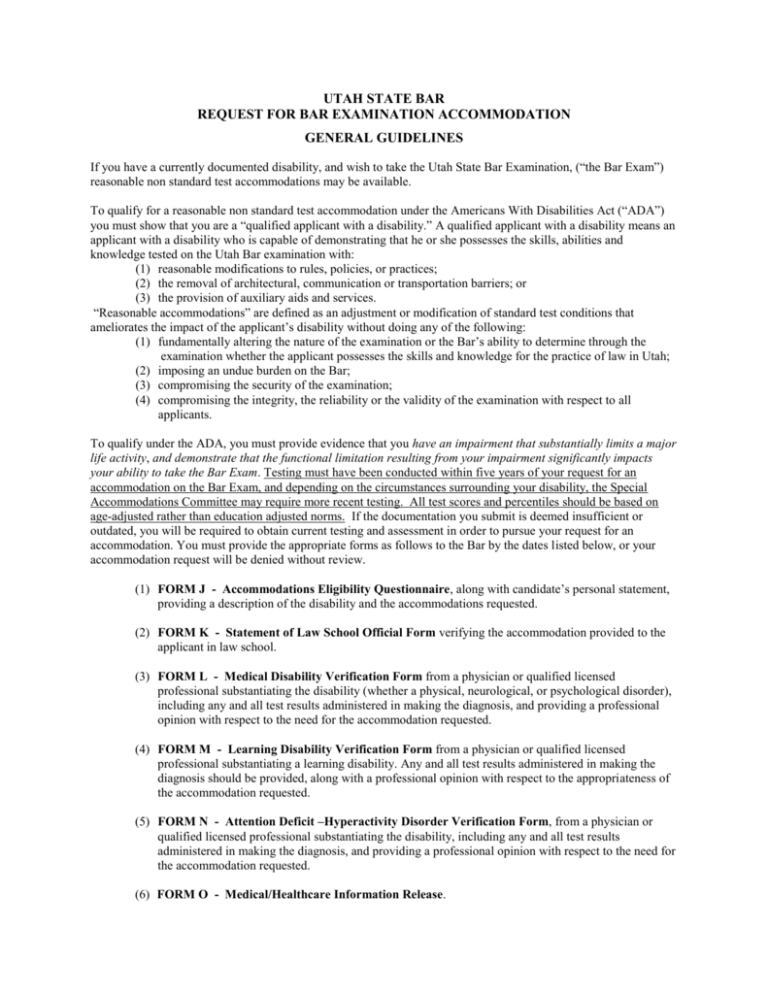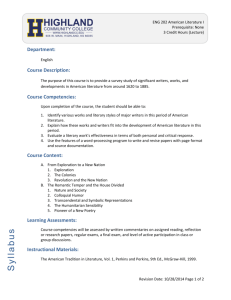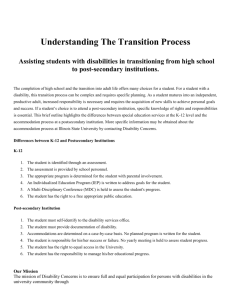General Guidelines for Test Accommodations
advertisement

UTAH STATE BAR REQUEST FOR BAR EXAMINATION ACCOMMODATION GENERAL GUIDELINES If you have a currently documented disability, and wish to take the Utah State Bar Examination, (“the Bar Exam”) reasonable non standard test accommodations may be available. To qualify for a reasonable non standard test accommodation under the Americans With Disabilities Act (“ADA”) you must show that you are a “qualified applicant with a disability.” A qualified applicant with a disability means an applicant with a disability who is capable of demonstrating that he or she possesses the skills, abilities and knowledge tested on the Utah Bar examination with: (1) reasonable modifications to rules, policies, or practices; (2) the removal of architectural, communication or transportation barriers; or (3) the provision of auxiliary aids and services. “Reasonable accommodations” are defined as an adjustment or modification of standard test conditions that ameliorates the impact of the applicant’s disability without doing any of the following: (1) fundamentally altering the nature of the examination or the Bar’s ability to determine through the examination whether the applicant possesses the skills and knowledge for the practice of law in Utah; (2) imposing an undue burden on the Bar; (3) compromising the security of the examination; (4) compromising the integrity, the reliability or the validity of the examination with respect to all applicants. To qualify under the ADA, you must provide evidence that you have an impairment that substantially limits a major life activity, and demonstrate that the functional limitation resulting from your impairment significantly impacts your ability to take the Bar Exam. Testing must have been conducted within five years of your request for an accommodation on the Bar Exam, and depending on the circumstances surrounding your disability, the Special Accommodations Committee may require more recent testing. All test scores and percentiles should be based on age-adjusted rather than education adjusted norms. If the documentation you submit is deemed insufficient or outdated, you will be required to obtain current testing and assessment in order to pursue your request for an accommodation. You must provide the appropriate forms as follows to the Bar by the dates listed below, or your accommodation request will be denied without review. (1) FORM J - Accommodations Eligibility Questionnaire, along with candidate’s personal statement, providing a description of the disability and the accommodations requested. (2) FORM K - Statement of Law School Official Form verifying the accommodation provided to the applicant in law school. (3) FORM L - Medical Disability Verification Form from a physician or qualified licensed professional substantiating the disability (whether a physical, neurological, or psychological disorder), including any and all test results administered in making the diagnosis, and providing a professional opinion with respect to the need for the accommodation requested. (4) FORM M - Learning Disability Verification Form from a physician or qualified licensed professional substantiating a learning disability. Any and all test results administered in making the diagnosis should be provided, along with a professional opinion with respect to the appropriateness of the accommodation requested. (5) FORM N - Attention Deficit –Hyperactivity Disorder Verification Form, from a physician or qualified licensed professional substantiating the disability, including any and all test results administered in making the diagnosis, and providing a professional opinion with respect to the need for the accommodation requested. (6) FORM O - Medical/Healthcare Information Release. The Bar will notify you in writing if we need additional information regarding your disability from your health care provider or testing specialist to process your accommodation request. Submitting an accommodation request packet does not guarantee that you will receive a Bar Exam accommodation. The fact that you received an accommodation during college or law school does not guarantee that you will receive an accommodation on the Bar Exam. It is important that you and your evaluator understand that the mere documentation of the presence of a disability does not entitle you to an accommodation. Rather, the impact of your disability on your ability to take the Bar Exam must be quantifiably documented so that reasonable accommodations can be determined. The Bar reserves the right to make the final decision on all requests for Bar Exam accommodations. I. Deadlines: If you are seeking an accommodation, we encourage you to register early for the Bar Exam. You must submit your accommodation request materials with your registration materials by the regular Bar Exam registration deadline. The Bar’s Test Accommodations Committee will review your request for accommodations, and will send correspondence regarding your request for accommodation, including its decision on your accommodation request, to the address you list on your Bar Exam registration materials. Please note: there are no exceptions to these deadlines. Accommodation requests submitted after the deadline indicated will be denied without review. II. Accommodation Options: The Bar Exam can be made available in large font, Braille, and on audiocassette. Depending on the nature of the disability, other accommodations may include the use of a reader, a scribe, a private room, or additional testing time. III. Bar Exam Testing Conditions: The test is administered in an environment similar to a classroom test setting. The candidates are allowed to use earplugs, but audio or visual distractions may be present. During the exam, candidates are permitted to leave the testing area to stretch or use the restroom. Day 1 of the Bar Exam consists of 6 essay questions and 2 Multistate Practice Test (“MPT”) questions over a 6-hour period. Candidates are allowed 30 minutes per essay question and one-and-a-half hours per MPT question. An hour lunch break is provided. Candidates must record their essay answers in written format, either writing by hand or by typing on a laptop computer. In responding to the Bar Exam questions, candidates must demonstrate their ability to identify legal issues and principles, analyze complex legal problems, and organize and articulate a comprehensive analysis of legal issues. Day 2 of the Bar Exam consists of 200 multiple choice questions answered over a 6-hour period. Candidates are allowed 3 hours per 100-question section of the test. Candidates answer by filling in circles on a scantron answer sheet. An hour lunch break is provided. IV. Information Required for Documenting a Physical or Mental Disability: A licensed health care provider with expertise in diagnosing and treating your mental or physical disability must document your disability by completing one or more of the disability verification forms listed above. Your name and social security number must be clearly indicated on all documents submitted by you and by your health care provider. It is your responsibility to collect the required forms and medical documentation from your health care provider and file it with your application by the registration deadline. The evaluation must have been conducted within the last five years. The diagnostician/evaluator must have comprehensive training and direct experience in working in the field (such as board certification by a recognized board). In completing the required forms(s), the evaluator must describe each of the following: (1) the academic credentials and qualifications that allow the evaluator to diagnose the disability and recommend accommodations to the Bar Exam. (2) your impairment, including (a) diagnosis; (b) history; (c) treatment, including medication, and the affect on your condition as a result of current treatment and/or medication; (3) any test documentation substantiating the disability, including the results of the Minnesota Multiphasic Personality Inventory (“MMPI”) where a psychological disorder is claimed; (4) the physical/mental limitations you currently experience as a result of your impairment; (5) how long the limitations are expected to last; (6) how your physical/mental impairment impacts the specific tasks demanded by the Bar Exam; and (7) how the accommodation you are requesting will reduce the impact of the documented functional limitation your disability imposes. A general description of typical symptoms found in people with your condition is not sufficient, nor are chart notes copied from your medical record without the analysis described above. Requests for accommodations must reference test results or clinical observations that support the need for the accommodation. V. Information Required for Documenting a Cognitive Disability: If you are seeking accommodation because of a cognitive impairment, such as a learning disability, a processing deficiency, or a physical, medical, or psychological disorder that affects your cognitive abilities, you must submit the appropriate forms as outlined above. The report from your diagnostician in support of your request for accommodation must include actual test scores, a specific diagnosis, and must recommend a specific accommodation based on the impact your disability will have on yourability to perform on the Bar Exam under the standard testing conditions. The analysis must reference the test results that support the need for the accommodation and articulate how the accommodation will reduce the impact of your functional limitation. A general description of typical symptoms found in people with your cognitive impairment is not sufficient, nor are testing notes without the analysis described above. As part of your accommodation request, you must submit a comprehensive neuropsychological or psycho-educational report prepared by a qualified diagnostician that was conducted within the last five years. All test scores and percentiles should be based on age-adjusted rather than education adjusted norms. The report must include the following: (1) a description of your presenting cognitive problem, including developmental history; (2) a neuropsychological or psycho-educational assessment with reports of aptitude assessments, using a complete comprehensive battery (e.g. Woodcock-Johnson Psycho-educational Battery-Revised: Tests of Cognitive Ability, Wechsler Adult Intelligence Scale III); (3) a complete achievement battery, including current levels of academic functioning in relevant areas such as reading (decoding and comprehension) and written language (e.g. WoodcockJohnson Psychoeducational Battery-Revised: Tests of Achievement, the Nelson-Denny Reading Skills Test, the Scholastic Abilities Test for Adults); (4) an assessment of information processing (e.g. short- and long-term memory, sequential memory, processing speed, executive functioning) using appropriate instruments (Wechsler Memory Scale, relevant subtests from the Woodcock-Johnson Psycho-educational Battery-Revised: Tests of Cognitive Ability; and (5) other appropriate assessment measures to differentiate a cognitive impairment from coexisting neurological and/or psychological disorders. For diagnoses of Attention Deficit/Hyperactivity Disorder (ADHD), you must provide relevant batteries as described above pursuant to which your diagnostician determined patterns of supportive attention problems. The report should include a measure of reading speed, and a review of relevant DSM-IV diagnostic criteria for ADHD. Your diagnostician must state whether the symptoms that cause impairment were present in childhood, the duration of your current symptoms, and the ameliorative affect of any prescribed medication or treatment. VI. Submission Upload all documents for your accommodation request through your online account. There is a place to upload “Test Accommodation Documentation”. VII. Notice of Decision on Accommodation Request: The Bar will notify you in writing of its decision on your request for accommodation.






